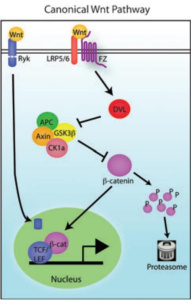Schizophrenia is a mental illness characterized by negative and positive symptoms. Positive symptoms include delusions and hallucinations. Delusions are beliefs that are untrue. Hallucinations are things that people see or hear that are not really there. Negative symptoms include loss of interest in daily activities, loss of motivation, and social withdrawal. Those with Schizophrenia are usually diagnosed between the ages of 16 and 30. Unfortunately, little is understood about the causes of schizophrenia, but it is believed to emerge from a combination of genetic and environmental factors.1
Genetic Factors
The gene primarily associated with schizophrenia is DISC1 (disrupted in schizophrenia 1 protein). DISC1 was found in a Scottish family that had cases of schizophrenia, bipolar disorder, and major depressive disorder. DISC1 plays a role in developing new neurons in the hippocampus, which is involved in memory and learning, during embryonic development and in adulthood. Abnormalities in this gene is linked to schizophrenia.2
Additionally, DISC1 also plays a role in Wnt signaling. In this figure we see that GKS3β acts on β-catenin, a protein. When Wnt is not active, GSK3β causes the phosphorylation of β-catenin which leads to degradation. If GSK3β is inhibited through Wnt binding, β-catenin is not phosphorylated and is able to enter the nucleus to stimulate TCF/LEF gene transcription. 
DISC1 directly inhibits GSK3β which allows β-catenin to stimulate TCF/LEF gene transcription.3 (paper) But, if DISC1 is abnormal, TCF/LEF is not stimulated and cells in the hippocampus cannot form during development.4
Environmental Factors
One possible hypothesis is that schizophrenia stems from issues in brain development. Some studies show that disruptions during pregnancy can increase the risk of schizophrenia in offspring. In general, those with schizophrenia have been shown to have lower cognitive ability than the general population. Further, people with schizophrenia had experienced developmental cognitive delays in their childhood.3
One environmental factor is fetal exposure to infection. One study has shown that pregnant women that become infected with influenza during the first half of the pregnancy produced an increased risk of schizophrenia in the child. Maternal exposure to herpes simplex virus 2 and rubella also showed an increased risk of schizophrenia in the child.
But prenatal malnutrition has also shown to create a risk for schizophrenia. Specifically, a maternal lack of vitamin D and homocysteine, a micronutrient, can increase the occurrence of schizophrenia. Additionally, in times of famine, schizophrenia had increased in offspring.5
What Can We Do?
One option to decrease the risk for schizophrenia would be addressing environmental issues, specifically, nutrition. In a study looking at the effects of nutrition on fetal development’s association with offspring’s mental health, it was found that proper nutrition during pregnancy promoted healthy fetal development and decreased the incidence of mental illness. Supplementing vitamins A and D was found to decrease the risk for schizophrenia while the use of omega-3 fatty acid before 20 weeks gestation increased the risk for schizophrenia.6 Although there are many environmental factors that affect fetal development, like malnutrition and exposure to infection, focusing on controlling nutrients may be a way to prevent schizophrenia.
- https://www.nimh.nih.gov/health/topics/schizophrenia
- https://www.ncbi.nlm.nih.gov/pmc/articles/PMC2722990/
- Singh, K. K. (2013). An emerging role for wnt and gsk3 signaling pathways in schizophrenia. Clinical Genetics, 83(6), 511–517. https://doi.org/10.1111/cge.12111
- https://www.ncbi.nlm.nih.gov/pmc/articles/PMC3763761/
- https://www.ncbi.nlm.nih.gov/pmc/articles/PMC3691516/
- https://www.ncbi.nlm.nih.gov/pmc/articles/PMC6984656/#:~:text=Omega%2D3%2Dfatty%20acid%20supplementation,childhood%20wheezing%20and%20premature%20birth.
